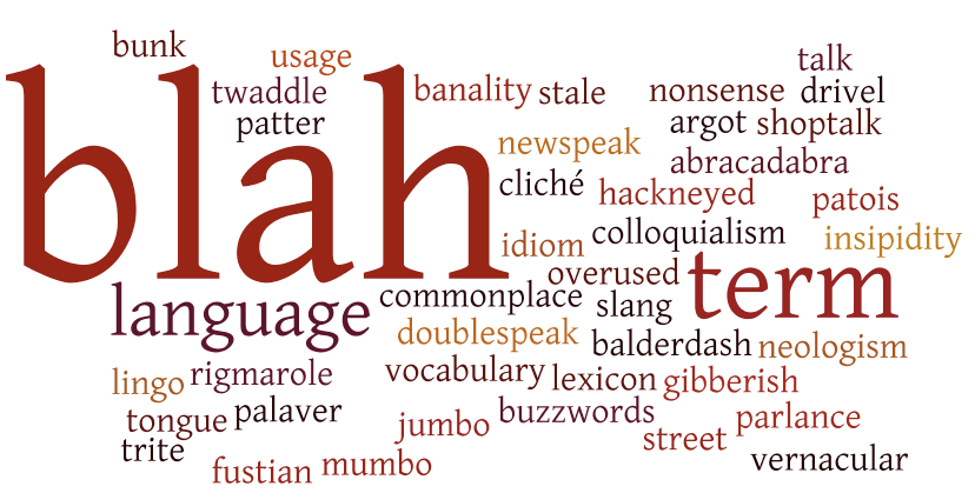Let's Talk About Business Jargon
Business jargon, also known as business-speak or corporate jargon, is rampant in the workplace. While you may think you’re reinforcing your insider status or using a fun turn-of-phrase to efficiently make your point, you may be perpetuating harmful stereotypes and otherwise diminishing your message. So here’s the rule about how and when to use tacky jargon to improve your communication: Don’t use it.
What’s Wrong with Business Jargon?
Terms like open the kimono and other business jargon are offensive, hackneyed, imprecise, and inspiring of great loathing. We regard business jargon derisively because it's speaking obliquely while using irritating or horrifying phrases: Vaguely aggressive, exploitative things like one throat to choke; bureaucratic imprecisions like learnings; psychobabble terms like core competency; or sinister euphemisms like human capital.
This is language deceptively streamlined to broadcast that everyone involved is so burdened by screaming time pressure that they don’t have time to communicate precise ideas in complete sentences. And in corporate-land, that’s a virtue.
Why do people adopt business jargon? Mostly because it gives employees a common tongue that helps create the illusion of a familial relationship or a team connection to compensate for the fact that many companies treat employees as replaceable. Hence the development of the term human resources.
What to Do Instead
Speak directly, precisely, and without weird terminology. If someone asks why you want Acme Widget Corporation to provide widgets, tell them that’s because their widgets are durable and cost-effective, not that widgets are Acme’s core competency, which communicates absolutely no data. To communicate more effectively:
- Use precise words, not jargon
- Be direct and say what you mean
Cut the Clichés
It’s undeniable: business jargon and racist and gendered clichés can make people feel alienated, uncomfortable, and disrespected. You’ll connect better with peers and clients when your speaking and writing does not include violent, racist, exclusionary, and confusing clichés.
Now that you know the problem, how do you improve? Relearning writing habits takes time and practice. It’s a process of correcting yourself (or being corrected!) again and again until you replace the old habit with a new one. WordRake can help you catch and correct your errors.
Here are some examples of clichés that WordRake changes to their literal meanings, helping you avoid miscommunicating with, alienating, or offending readers:
Business Jargon
What they brought to the table offered was a fresh perspective and a readiness to innovate.
There are just so many moving parts It is so complicated.
When push comes to shove Ultimately, we’re willing to compromise on several points.
Racist Idioms
I felt gypped cheated by the smooth-talking salesman.
The project manager opened the kimono revealed the process to the client, explaining potential challenges and strategies.
They consulted May Walsh, a guru an expert on public parks and green spaces.
Gendered Terms
The program streamlines the process for launching manned crewed and unmanned uncrewed spacecraft.
Mankind Humankind must think about what kind of world they want to leave for future generations.
Cashiers are manning staffing the ticket booth until one hour before the zoo closes.
Choosing the right words in your writing takes work. WordRake can help. The software works in Microsoft Word and Outlook, offering track-changes edit suggestions to improve brevity and simplicity, including cutting jargon and clichés from your writing. It’s the perfect way to get impartial feedback on word choice before you share your document or email with others. Read more about business jargon to avoid in this Writing Tip.
Conclusion
Great communication is key to building your professional relationships and reputation. Boost your career (and integrity) by being mindful about your word choice and cutting out business jargon and clichés—it’s distasteful and can hinder communication. Now is the time to practice weeding out jargon from your writing. WordRake editing software is a valuable addition to your writing toolkit that helps you achieve direct, concise writing so your meaning is clear and professional. Get started cleaning up your writing habits—try WordRake free for 7 days.








